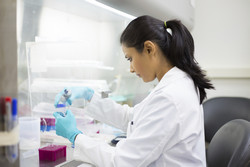Biomarkers for healthy food
Many supermarkets and health shops stock their shelves with foods and supplements claiming to have various health benefits. Since new EU legislation requires scientific evidence for any food labels or adverts implying a link between the food's constituents and health, the EU-funded BIOCLAIMS(opens in new window) (Biomarkers of robustness of metabolic homeostasis for nutrigenomics-derived health claims made on food) project developed indicators that can measure health benefit claims. Known as biomarkers, these indicators measure the body's normal physiological state as a baseline against which physiological changes can be measured. These changes, for example in a person's metabolism, may be due to disease, food choices, vaccines, or health-promoting foods and supplements. BIOCLAIMS identified and verified the potentiality of a number of candidate biomarkers associated with obesity and several other metabolic disorders in animal and human studies. Using an approach called nutrigenomics, researchers looked for molecular-level interactions between dietary components and test subjects' genes. For example, they found candidate biomarkers in blood cells that may predict a person's risk for developing diabetes and other alterations later in life. Researchers also discovered that certain fats and lipids circulating in the blood serve as biomarkers for high cholesterol. Amino acid profiling, meanwhile, may be used to identify gender-specific metabolic disorders that lead to obesity. Impaired liver, muscle and kidney function can also be detected early using protein damage biomarkers in urine. Apart from screening for disorders, these and other biomarkers will be used to measure the effects of food components on both normal and impaired health. Researchers have already confirmed that leptin, a hormone that inhibits hunger, prevents suckling mice from developing obesity-related chronic diseases later in life. Using biomarkers to identify humans at risk for developing obesity will allow early intervention by, for example, supplementing infant formula or even breast-fed babies with leptin. Biomarkers developed in BIOCLAIMS will eventually allow legislators to monitor health claims on food while improving human health by detecting potential problems early in life.







